In Jammu and Kashmir, 40.89 percent of private school teachers use only 19.25% of the entire educational infrastructure to teach 45.60 percent of the total student population and deliver a result of 92 percent at a fraction of the cost that the government spends on its school network. This may change as a series of interventions are interrupting the sector, stakeholders tell Masood Hussain
In the last tenth class results announced by the Jammu and Kashmir State Board of School Education (BOSE), 118791 (79.89 per cent) of 148701 candidates from across 22 districts of erstwhile Jammu and Kashmir were declared successful. This was the first result that BOSE announced after the implementation of the single academic calendar.
The devil, however, was in the details. In Kashmir, where the cumulative pass percentage was 86.71 per cent, students appearing from private schools performed better. Unlike the government-run schools recording a pass percentage of 79.83 per cent, the private schools scored 93.86 per cent. It was almost the same trend in Jammu where the pass percentage of government schools was only 65.99 per cent in comparison to the private institute having 89.15 per cent. In Ladakh, however, both types of schools were better than in Kashmir and Jammu. There, government schools recorded 80.7 per cent and private schools 95.28 per cent.
The other trend that BOSE results exhibited distinguished Kashmir from Ladakh and Jammu. In Kashmir, 49.04 per cent of all the candidates who wrote their examinations were from privately run schools. The share of the private schools in the overall appearance for the tenth class examination was 34.2 per cent in Jammu and 33.91 per cent in Ladakh.
Thriving Sector
Over the years, the private education sector is thriving across Jammu and Kashmir. It is more visible in Kashmir where for parents education of their wards in the private sector is the first preference. This is a trend that is not Kashmir-specific. Almost half of the children across India study in the private sector.

While this trend has helped in the evolution of competitive education at the elementary, and partly at the secondary level, it is a huge business and perhaps a dependable livelihood option for a vast population, especially educated women.
On the ground, the numbers tell a fascinating story about the efficiency and the outcome of the private sector. A recent official document, available with the Kashmir Life, put the total number of schools in Jammu and Kashmir at 28700. It includes 23173 schools run by the government, which means the government has a share of 80.74 per cent in the school education infrastructure. In comparison, there are only 5526 schools run by the private sector, which is only 19.25 per cent of the share in the relevant infra.
The outcome is interesting. The enrolment in government-run schools is 14,73, 368 – which is 54.40 per cent of the overall enrolment of 27,08,651 in all the schools. The private sector caters to 12,35,033 students, which is 45.60 per cent of the total enrolment. Even human resource figures are interesting. Of the total of 166392 teachers running the show, the government has 98348 teachers on rolls (59.11 per cent of the total teacher population) and the balance of 68031 (40.89 per cent) are in the private sector.
The Annual Status of Education Report (ASER) added another interesting detail in 2022. It located sort of stagnation in the human resource managing Jammu and Kashmir’s education sector and found the private sector robust in comparison. In 2018-19, the survey found 170449 teachers running the show – 104184 in the government sector and 66031 in the private sector. It found more females (40826) serving the private sector in comparison to government schools (38672). The same figures altered hugely by 2021-22 when the teacher population fell to 167106 – 98348 in government and 68031 in the private sector. There were only 36785 female teachers left in government schools while the private sector had hired more, reaching a total of 43190.
There is no comparison of the costs. The government spends many times more than the private sector. The outcome, however, makes an interesting one-liner: In Jammu and Kashmir, 40.89 per cent of teachers use a petty 19.25 per cent of the educational infrastructure to teach 45.60 per cent of the pre-primary to the secondary level student population and deliver a result of 92 per cent.
The situation is still improving. Issues related to toilets, water points, computers, libraries, electricity, internet and transport do not exist in the privately run schools. Most of the private sector schools have pre-primary sections; an idea now being implemented in the government section after the NEP-2020 was adopted. The teaching of English is basic in the private sector.
That is perhaps why private school continues to be the priority for parents to educate their wards. In 2019-20, 48.15 per cent of 1832140 students studying from the first primary to the tenth class across Jammu and Kashmir were enrolled in private schools. This percentage reached 48.63 per cent in 2020-21 but fell to 46.49 per cent in 2021-22. The overall enrolment for the first ten classes (excluding pre-primary) in Jammu and Kashmir was 1852745. In Kashmir, there are certain districts where government schools barely get 40 per cent of the new admissions.
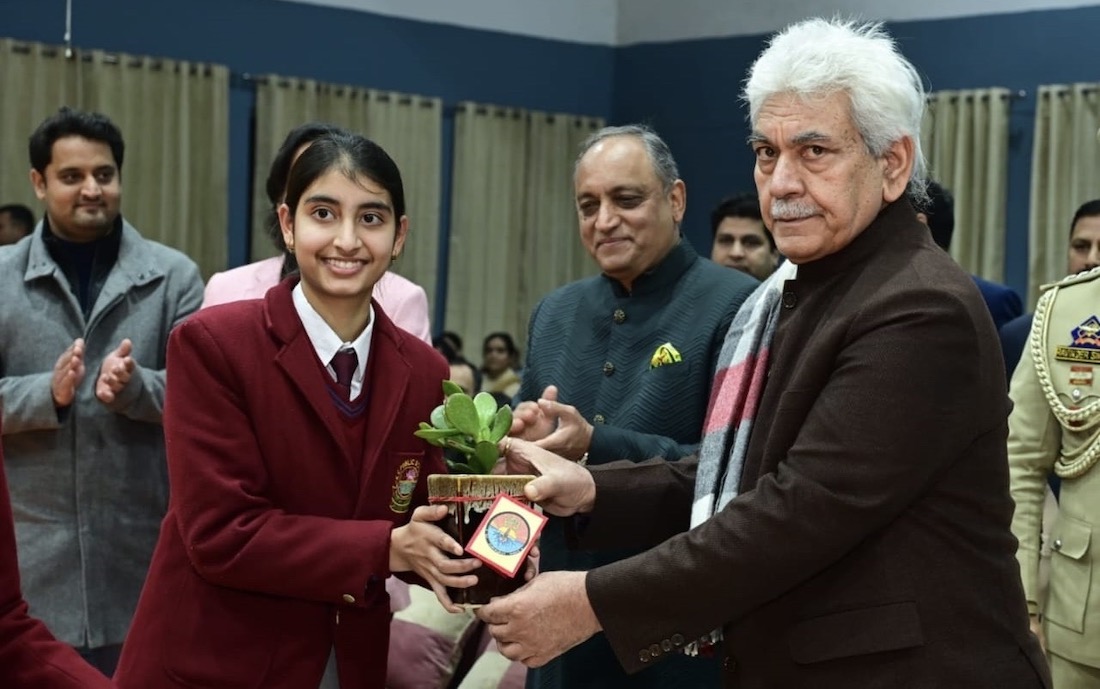
LG Sinha’s Speeches
“Our education sector had witnessed stagnation for more than three decades. It had adversely impacted the society’s morale and the country’s confidence was shaken,” LG Manoj Sinha said while inaugurating the new campus of Asian School at Miran Sahib (Jammu) on January 29, 2024, asserting how the Prime Minister has instilled new confidence in the society. “Transformation of the education sector should be our commitment. Private educational institutions must adopt some measures to ensure that education is accessible, affordable to all so that marginalised section of society is benefitted and education sector is truly inclusive.”
Earlier, on January 28, while inaugurating the floodlight system at KC Public School’s Multi-Sports Ground, Sinha insisted on education being the top priority. “Education is the most powerful instrument for nation-building,” he asserted. “We must make every effort to ensure that quality of education is maintained, education is inclusive, education is future-oriented and education is capable of facing the challenges of the twenty-first century.”
Sinha’s assertions are broad pointers towards the importance of the sector and his administration’s indication that it will be using the NEP-2020 to make the shift to the next level. Somehow, however, the stakeholders in education feel that the rise of Jammu and Kashmir’s private sector is not being appreciated enough. “I have always maintained that the LG Sahab is very supportive of things but somehow something is getting lost in translation,” GN Var, who heads the private school association, said. “We have issues that are eluding a solution and off late more issues have cropped up.”
Fee Fixation
The education in private sector is a self-regulating activity. It costs. However, reports of exploitation at certain levels led the Supreme Court to direct fee fixation committees in the states in 2013. In Jammu and Kashmir, a retired High Court judge presides over the committee that regulates the changes in the fee structure of the schools since July 2015. The committee is mandated to approve or reject claims based on the infrastructure and the requirements of a private school. It is currently being presided over by Sunil Hali, a retired High Court judge.
“We do not have issues with the Committee,” one senior school owner said. “We only have a problem that the committee lacks time and human resources to respond to our pleas. The Committee is managed by a group of officials for whom it is physically impossible to manage such a large number of schools.”
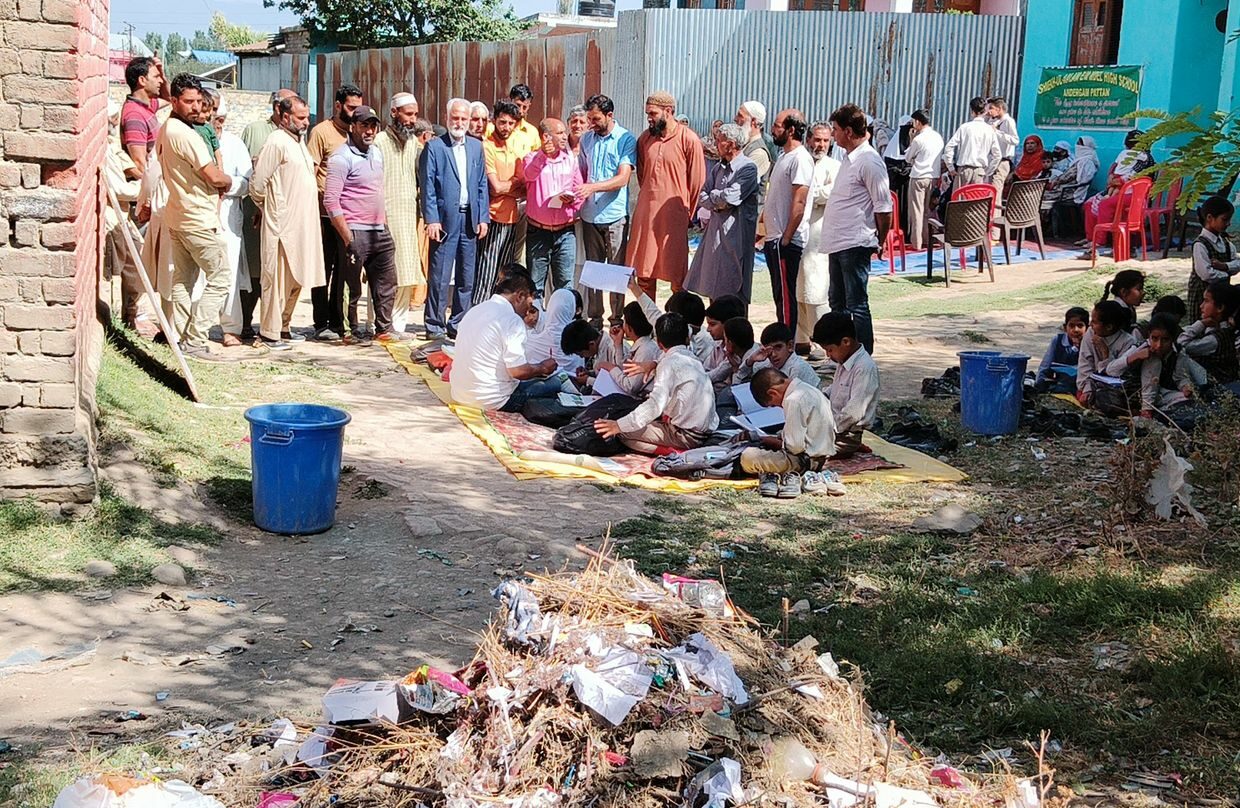
The Committee should ideally go for an inspection of the school that moves an application for a change in fee structure, the stakeholders suggest. They should quickly reject or accept it, rather than keeping it hanging. “Schools run on the fees that students pay and any change in the expenditure of the school can impact the existence of the institution itself,” GN Var, who heads the private school association, said. “We had requested that the schools be permitted to hike fees by 10 per cent every year so that it covers the routine inflation. Earlier it was happening but now they do not permit it.”
Var said in most of the states, the assemblies have legislated laws that help run the private sector normally. “There, the intervention of these fee committees is minimal,” he said. “Here, the Committee is empowered but lacks the capacity.”
The NOC Set
Any private affair is supposed to be permitted by the government only after it has proper permission from various regulatory bodies. Var said the number of Non-Objection Certificates (NOC) that every school requires for registration and renewal of registration is too huge and cumbersome.
“We need to have proper NOCs certifying building safety, fire safety, chemical safety, non-involvement (political) certificate, traffic NOC, pollution control board certificate, municipality permission, land certificate and even building permission,” Var said. “There are many more but these are the main ones.”
In certain cases, Var said, some of the school owners were too frustrated to manage these certificates as a result of which these institutions closed. “NOCs apart, there might have been other issues linked to fees as well but the fact is that these got closed.”
SO 177
Off late, the administration has promulgated a government order called SO 177 on April 15, 2022. It pertains to the premises from which a particular school operates. A school owner must have an NOC under this order, which essentially is about the land.
Explaining the order, a school promoter said either the land must be the propriety land of the owner or it must be on rent for not less than a decade. In the case of rent, the owner must possess a land lease document.
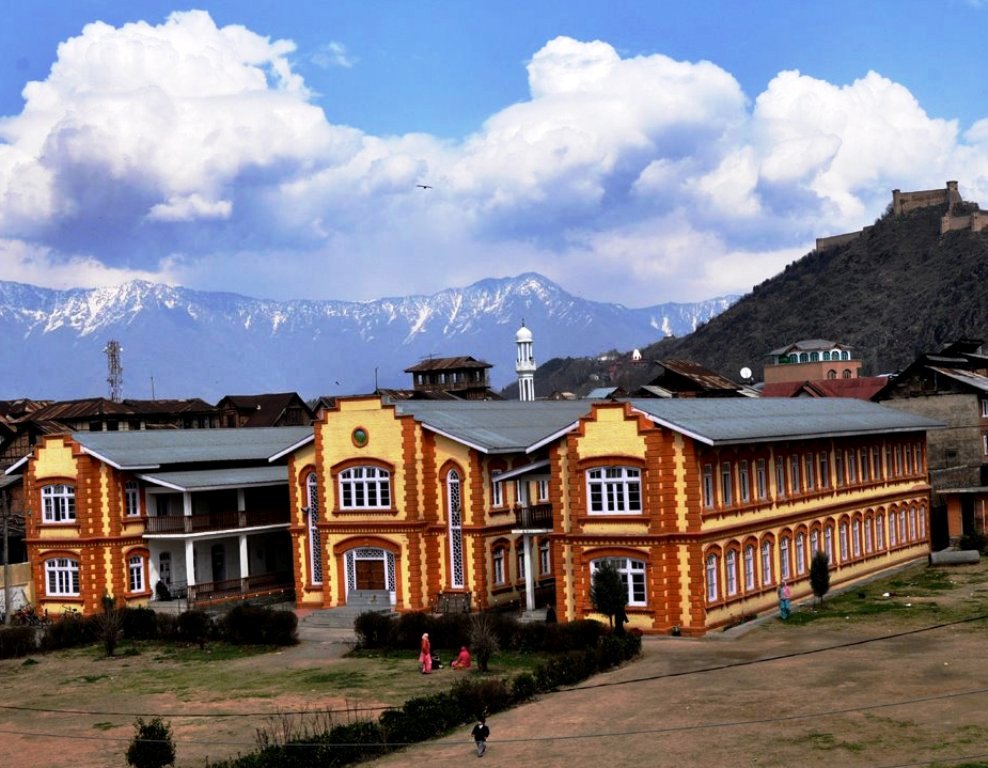
Most of the schools were caught in this regulation. “If 99 per cent of the premises are owned and one per cent is state land, it is being seen as illegal,” the school owner said. “The other problem is that people usually avoid getting into lease agreements. Normally people give documents for three months to a year. In case they get ready, the lease-doer bleeds for court fees.”
Private school circles said they are caught in a catch-22 situation. “If one attempts to lower the rent cost to save court fee, the pay fixation committee will not permit fee enhancement and if he does go by the market rates, he has to pay hefty fees for lease,” one owner said, insisting he knows of one such lease deal in which the court fee was Rs 13 lakh.
“We have been meeting the government and the only plea is that kindly avoid rushing with the decisions,” Showkat Choudhary, who is also running a major school said. “We have no other option but to plead before the government.”
Tagging
It was against this backdrop that many schools operating from state land were tagged. Their students were barred by the BOSE from appearing in the matriculation examination and were asked to secure admissions in the nearest government schools so that their careers would not impacted.
To prevent the BOSE from tagging the schools, the school owners went against the order to the court of law. “We have four benches issuing as many as 37 orders, most of which are speaking orders directing that registration of these schools should remain intact, BOSE must issue RR (registration return) and the position of these schools should be retained at pre-SO-177 level but the BOSE continued with its exercise,” Var said. “Now the petitioners have gone to a division bench of the High Court with the contempt of court plea and the next date of hearing is March 19.”
Var said almost 250 schools stand tagged including 210 from Kashmir. The main issue involving the tagging is that these schools operate from state land, fully or partially. The order, he said, treats all land as state land as long as it is not owned by the promoter of the school. He said one of his members has informed the association that in some districts a similar order has been issued to certain schools suggesting they enrol the students of eighth class to the neighbouring government school.
The Narwara Story
In Srinagar, Ms Sultana is one of the 145 economy and budget school owners whose Sheikh ul Aalam School at Narawara has been tagged. “I have been running this school since 1983. We have 25 staffers teaching 300 students on our rolls and there has not been a year when we did not figure in top 20 positions,” Sultana said. “This year, I enrolled 32 of my students in the neighbouring government school under BOSE directions.”
Sultana’s school has an interesting story. She rented a building that the local Auqaf owned since 1920. “I used to pay them rent and now the government says the land belongs to the state and Auqaf is an encroacher,” Sultana said. “In my neighbourhood, there are two government schools in buildings that the same Auqaf owns and the government pays them rennet, almost the same style we follow. But they are legitimate and not us.”
After BOSE orders, she enrolled 32 students in the government school. What is interesting is neither of the two schools that the government runs has not even one-fifth of the roll her school has.
The schools that have been tagged in Srinagar include the historic Islamia School, the first Muslim school in the region, the Vishwa Bharti School, Zadibal’s historic Imamia Public School and many others.
The Saint Joseph School
Interestingly, the implementation of the order has been uniform. One of the schools that took the impact of this order is the prestigious and one of the oldest, the Saint Joseph School of Baramulla. Founded by Father C Simon, somewhere in the fall of the nineteenth century, it formally started operating in 1903. A Catholic School, it is being run by the Catholic Diocese of Jammu-Srinagar.
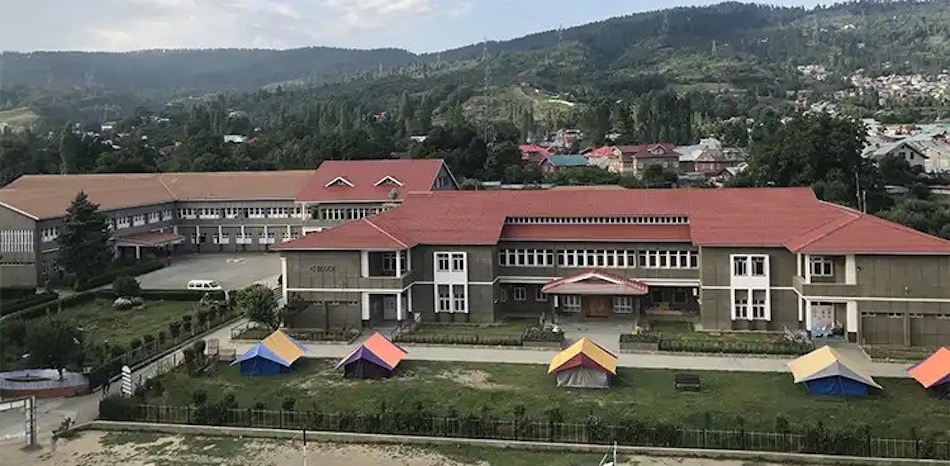
Holding the same status as Burnhall in Srinagar, Saint Joseph has significantly contributed to the education in the north Kashmir region. It has remained a part of Kashmir’s history as it took a huge brunt during the tribal raids in 1947. This time, however, it lacked the lease papers, unlike its cousins in Srinagar, who managed lease renewal at the peak of a crisis post-2019.
The school’s lease expired in 2018 and is yet to be renewed. Sitting on the prospects of closure, the school issued a notice to parents stating that the management was “doing everything possible” to keep the school open, but it also acknowledged that the school’s future was uncertain.
“It is just not a school, it is a history and it is heritage,” one erstwhile student, now a well-established professional said. “Who will listen?”
BOSE Text Books
The latest intervention was the directions by the BOSE that all schools including the private schools must teach the textbooks, which are published by the BOSE. All BOSE-affiliated schools in Jammu and Kashmir used to teach NCERT books for ninth and tenth standard. On August 26, 2022, the BOSE directed the schools to adopt BOSE textbooks for sixth and eighth classes as well.
Late last year, another order was issued asking the schools to include BOSE textbooks for the primary classes as well.
Schools had best-of-the-market text books in pre-primary and primary schools. The new direction hit at the academic authority of the school promoters on one side and the textbook sellers on the other side. There were 1101261 students enrolled in all schools across Jammu and Kashmir in five classes in 2021-22.
“It is not a small intervention,” Waseem Javed, a spokesperson of the booksellers association said. “We are 2370 booksellers across Jammu and Kashmir and the primary schools have cumulative textbook requirement of Rs 140 crore a year. It could be a loss of livelihood to thousands and also impact children’s right to have the best and most competitive books.”
The booksellers went to court against the order. During arguments, it pushed to a situation in which the main debate became whether the BOSE has authority or not. The bench upheld the order. Now the booksellers are planning to go to the division bench challenging the single bench order but they have yet to take the final call.
Most of the textbook suppliers are not publishers. They acquired the stocks from around 400 reputed publishers in Delhi and elsewhere. The texts are decided by the school management and then the market gets in. In state-run schools, the government is providing textbooks already so the decision will impact BOSE-affiliated private schools only.
BOSE, Javed said has not been into publishing textbooks for primary classes unlike the middle and the secondary classes. Though mostly NCERT books, there are certain sections or books that are done by the BOSE academic section. However, BOSE books are unimpressive textbooks. They have bad printing, cheap paper, unimpressive design and mixed language. “One can have American English in one chapter and British in another,” one insider said. “There are huge proofing mistakes and these are unattractive.”
This was perhaps the reason why many schools have shifted away from BOSE and joined the Central Board of School Education (CBSE). “There is a better system at work,” one school owner, who is contemplating joining the CBSE, said. Shifting from BOSE to CBSE takes almost three months as it also requires certain NOCs. “You have modern textbooks and you enjoy the same freedom in choosing teaching material that is available in Delhi and Mumbai.”
Schools say choosing the textbook is fundamental to the teaching process and it eventually is linked to the outcome of the process and the reputation of the institution. Showkat Choudhary said that when parents come to know about private schools teaching the same books as prescribed by the BOSE, they will not send their wards to private schools.
A school owner said the crisis started showing up after the Vision Document 2047 was issued by the Jammu and Kashmir Planning Department in which, in the SWOT analysis of the elementary education set-up, one of the two “threats” mentions: “monitoring the objectives of private educational institutions”.
Waseem Javed said they are still making efforts to get some concessions. “We met the Chief Secretary and he patiently heard and understood our crisis,” Javed said. “We have an indication that we may get some flexibility in managing our stocks but eventually things are unlikely to change.” Right now, he said the file is with the Education Department at the top level and a final decision may be out early next week.
Testing Times
Var, Choudhary and many others said they have only two options. One is to approach the top functionaries of the government and the other is the court of law. While most of these cases have already landed in the court, the stakeholders are meeting the officials to see if there is some way out.
“A senior functionary told us that while it is possible that we can address the petty issues (chotay moutay maslay), they cannot help either in the tagging issue or the textbook issue,” one of the functionaries said, insisting more than 100 schools have already closed in last three years.
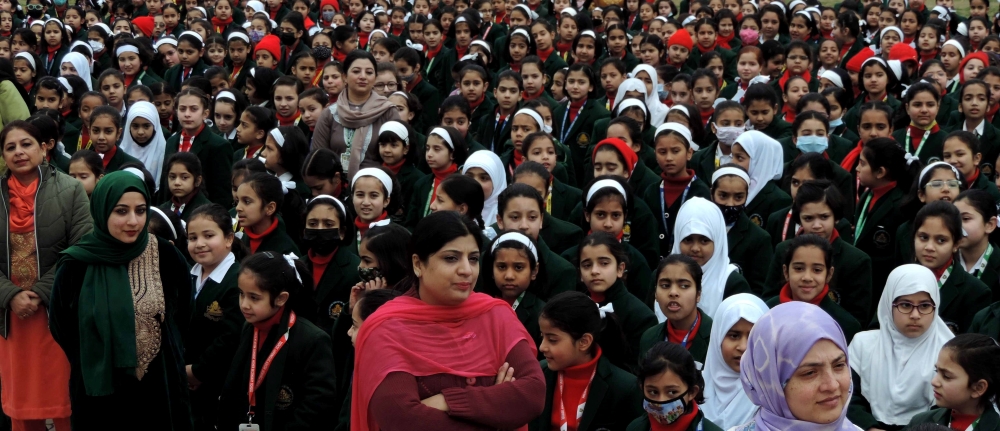
They hope that if the policymakers are positive, viable options could be explored. These include leasing the lands or offering the schools the right to purchase of land at market rates. Raj Bhawan has already permitted RR issuance in the case of Army-run Goodwill Schools, which operate from state land. On textbooks, they believe the same regulation should ideally be in vogue in Jammu and Kashmir as in the rest of the country.
School owners and booksellers now see some hope in the decision-making by LG, Manoj Sinha. “He is aware of the importance and the sector and the change it can trigger,” one stakeholder said. “We believe the decisions will be made in the larger interests of the sector.”
Post Script: After the magazine was published, Jammu-based leader of private schools, Ajay Gupta sent Kashmir Life a detailed representation. Here is the gist of the long communication:
“Over time, a sympathetic approach towards private schools has prevented many small institutions from closing down. However, the entire system has now collapsed due to the current circumstances.
On September 18, 2023, the Financial Committee of JKBOSE issued a notification (No: F(Acad-C)/Dyn/Aff/fee/23) introducing dynamic affiliation fees based on student enrolment in Private High/Higher Secondary schools, along with GST @18 per cent. This decision, made without considering the ground realities and financial status of small schools, is unjust and strongly condemned. The sudden increase in affiliation/inspection fees by JKBOSE, without consulting stakeholders, is particularly egregious given the decline in enrolment, with many small private schools experiencing up to a 250-student decrease from classes 1st to 12th.
Before addressing the issues and demands, it’s crucial to understand the historical context of education policies in Jammu and Kashmir. Various Acts governing education, including The Primary Education Act (samvat 1986), The J&K Private Educational Institution (Regulation & Control) Act 1967, and The J&K Education Act 1984, were replaced by the J&K School Education Act 2002. Subsequent notifications and amendments have created challenges, leading to legal challenges and amendments to mitigate these issues.
Despite efforts to streamline processes, delays in obtaining essential safety certificates and other clearances persist, hindering the affiliation/extension/recognition of private schools. Additionally, fee fixation committees were established to prevent exploitation in unaided private schools, allowing for limited fee increases based on predefined criteria.
However, disruptions caused by events like the Pulwama attack, Article 370 abrogation, and the COVID-19 pandemic have severely impacted private schools in the region. Besides, he government enacted several amendments to the Jammu and Kashmir School Education Rule, 2010, leading the School Education Department to issue a notification on April 15, 2022 (vide SO 177). However, private schools situated on State/Kahchari land face challenges as the government requires a ‘No Objection Certificate’ from the Revenue Department for affiliation/extension/upgradation. We support rightful government decisions but urge equal treatment for all establishments on State/Kahchari land, including apartments, hotels, residential buildings, etc., not just private schools. This selective approach is unjust and unreasonable.
In light of these challenges, we urge the following actions:
Reviewing the notification SO 233 issued on May 10, 2022.
Co-opting a representative of a recognised school association as an expert member to address parental concerns.
Setting upper limits on fees based on paying capacity, topography, and geographical conditions, allowing for annual fee increases of up to 10% to match inflation.
Strictly enforcing government guidelines to promote transparent teaching and learning and curb dummy admissions.
Publishing lists of de-affiliated/de-recognised schools before the commencement of the new academic session, enabling parents to make informed decisions.
Adjusting dynamic affiliation fees based on per-student enrolment to ensure fairness for schools with low enrolment.
Organizing orientation programmes for private school teachers at district levels to support the implementation of the National Education Policy 2020.
These measures aim to address the pressing issues facing private schools in Jammu and Kashmir, ensuring the continued provision of quality education despite challenging circumstances.”















